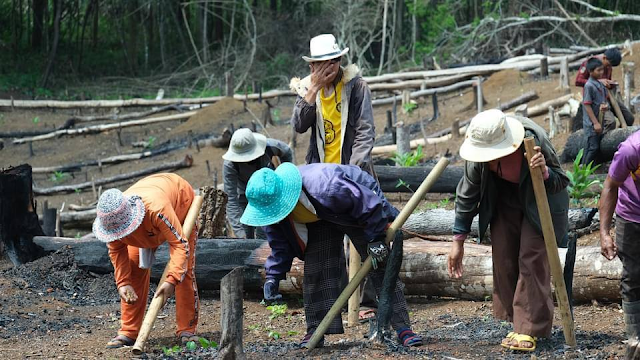Indigenous Bunong concerns losing their ancestral land and identity
It's my first time visiting the local indigenous villages in Mondolkiri. I learned and knew some good and unhappy things from the indigenous people about the situation in the rural community.
 |
| Traditional growing rice on their collective farm in the local community. (Photo: Bunong Youth) |
Bunong is the largest indigenous group living in several northeastern regions of Cambodia. As reported by the Cambodia Indigenous Peoples Organization-CIPO, Cambodia has an estimated 55,704 Bunong who have been living for many centuries.
Therefore, in the local community, all villages were covered by deep forests, and many types of animals live around their houses. Mostly, indigenous Bunongs do farming and protect natural resources. However, there are many unconditional issues that indigenous peoples face with authority, companies, powerful people, and their people. This main issue is really hard to solve and find solutions for the remote community.
According to Ms. Plek Phearum, a woman and member of the community committee who is strongly committed to fight for indigenous rights and justice for all indigenous peoples. She described the situation in her whole community. She continued, "We’re all indigenous and facing many types of issues in the rural area where Bunong lives." There are main issues in the community as well as local people’s concerns about losing their ancestral lands, collective land, and natural resources. A private company and some powerful people are trying to steal their protective lands and destroy their forests.
Besides, she added that recently, some young Bunong youth, rarely use their native language, and some adults are shy about recognizing themselves as Bunong to their friends and the public. At the same time, "some youths have not shown their traditional clothing," she said.
In the same case, Mr. Ly is a Bunong activist in the local community of Bunong. He expressed that there are many challenges in his rural village. The powerful persons collaborated with the private company to steal his farmland, indigenous ancestral land, and even their cemetery areas. These main issues continue facing off with authorities and companies who tried to stop them and forced them to replace their land. Local authorities arrested a few activists because they were claiming their lands from the company and fighting for their justice and rights to keep their natural resources for the younger generation.
Most of them hope and wish that someday they would possibly find good solutions for their rights, justice, and transparency. "The government should not ignore the issue; they must provide justice to their community," a youth wished. Additionally, they want to see their young generation being unity, protect the traditional culture and protect their nation.


Comments